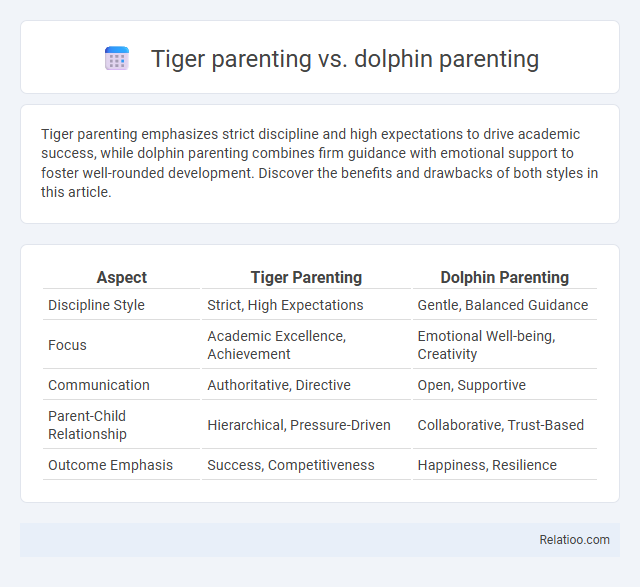Tiger parenting emphasizes strict discipline and high expectations to drive academic success, while dolphin parenting combines firm guidance with emotional support to foster well-rounded development. Discover the benefits and drawbacks of both styles in this article.
Table of Comparison
| Aspect | Tiger Parenting | Dolphin Parenting |
|---|---|---|
| Discipline Style | Strict, High Expectations | Gentle, Balanced Guidance |
| Focus | Academic Excellence, Achievement | Emotional Well-being, Creativity |
| Communication | Authoritative, Directive | Open, Supportive |
| Parent-Child Relationship | Hierarchical, Pressure-Driven | Collaborative, Trust-Based |
| Outcome Emphasis | Success, Competitiveness | Happiness, Resilience |
Understanding Tiger Parenting: Key Characteristics
Tiger parenting emphasizes strict discipline, high expectations, and academic excellence, often prioritizing obedience and hard work over emotional expression. This style contrasts with dolphin parenting, which balances structure with empathy, fostering independence and creativity in children while maintaining supportive guidance. Cultural influence plays a significant role in shaping these approaches, as tiger parenting is prevalent in East Asian communities valuing collective success and diligence, whereas dolphin parenting aligns more with Western ideals of individuality and emotional intelligence.
Exploring Dolphin Parenting: Core Principles
Dolphin parenting emphasizes flexibility, emotional support, and balanced discipline, contrasting sharply with the strictness of tiger parenting. Rooted in modern psychological research, this approach promotes open communication and nurtures creativity while setting clear boundaries. Cultural influence shapes how parenting styles manifest, with dolphin parenting gaining traction in societies valuing individualism and emotional intelligence.
Origins and Cultural Contexts of Parenting Styles
Tiger parenting originates from East Asian cultural values emphasizing academic excellence, obedience, and strict discipline rooted in Confucian ideals. Dolphin parenting, emerging from Western contexts, promotes balanced nurturing, emotional intelligence, and autonomy, reflecting contemporary psychological research and progressive educational theories. Cultural influences deeply shape these parenting styles, with Tiger parenting reflecting collectivist traditions focused on societal success, while Dolphin parenting aligns with individualistic cultures prioritizing self-expression and personal growth.
Comparing Discipline Approaches: Tiger vs Dolphin
Tiger parenting emphasizes strict discipline, high expectations, and structured routines to drive achievement, often valuing obedience and academic success above all else. Dolphin parenting balances supportive guidance with reasonable freedom, fostering self-discipline and emotional intelligence while encouraging independence and creativity. Your choice between these approaches can significantly affect your child's development, considering how cultural values shape whether firmness or flexibility predominates in parenting styles.
Impact on Academic Performance
Tiger parenting emphasizes strict discipline and high expectations, often leading to strong academic performance but increased stress and anxiety in students. Dolphin parenting balances firm guidance with emotional support, fostering motivation and resilience that positively influence academic success and well-being. Your academic performance is also shaped by cultural influences that dictate parental involvement styles and value systems, which can either enhance or hinder educational outcomes depending on the context.
Emotional Health and Self-Esteem Outcomes
Tiger parenting, characterized by strict discipline and high expectations, often leads to increased academic achievement but may negatively impact emotional health and self-esteem, causing anxiety and depression in children. Dolphin parenting, which balances guidance with empathy and flexibility, tends to foster better emotional well-being and higher self-esteem through supportive communication and respect for individuality. Cultural influences shape these parenting styles by embedding societal values and norms, where collectivist cultures may favor tiger parenting for social conformity, while individualistic cultures align more with dolphin parenting prioritizing emotional autonomy.
Social Skills Development in Children
Tiger parenting emphasizes strict discipline and high expectations, which can sometimes limit children's social skills development by prioritizing academic achievement over interpersonal interactions. Dolphin parenting adopts a balanced approach, encouraging empathy, communication, and emotional intelligence, thereby fostering stronger social skills and adaptability in children. Your child's social skills development is significantly influenced by cultural norms that shape parenting styles, affecting how they interact with peers and navigate social environments.
Balancing Structure and Flexibility
Tiger parenting emphasizes strict discipline and high expectations to foster academic excellence, while dolphin parenting balances clear boundaries with empathy and adaptability to encourage creativity and emotional growth. Cultural influences shape these parenting styles by defining societal values and norms that prioritize either achievement or individual well-being. Effective child development requires integrating structure and flexibility to accommodate diverse cultural contexts and promote both resilience and autonomy.
Parental Expectations and Child Autonomy
Tiger parenting emphasizes strict parental expectations with high academic and behavioral standards, often limiting child autonomy to ensure success. Dolphin parenting balances firm expectations with empathy, promoting autonomy by encouraging open communication and emotional support. Cultural influence shapes these approaches, as collectivist societies may prioritize Tiger parenting for group success, while individualistic cultures lean toward Dolphin parenting to foster personal growth and independence in Your child's development.
Choosing the Right Parenting Style for Your Family
Choosing the right parenting style for your family requires understanding the distinct approaches of Tiger parenting, which emphasizes high expectations and discipline, Dolphin parenting, known for its balanced blend of empathy and structure, and the powerful role of cultural influences that shape parenting values and practices. Your family's unique cultural background and individual children's needs should guide the decision to adopt a style that fosters both academic success and emotional well-being. Research shows that flexible parenting strategies tailored to cultural context and child temperament lead to healthier development and stronger parent-child relationships.

Infographic: Tiger parenting vs Dolphin parenting
 relatioo.com
relatioo.com